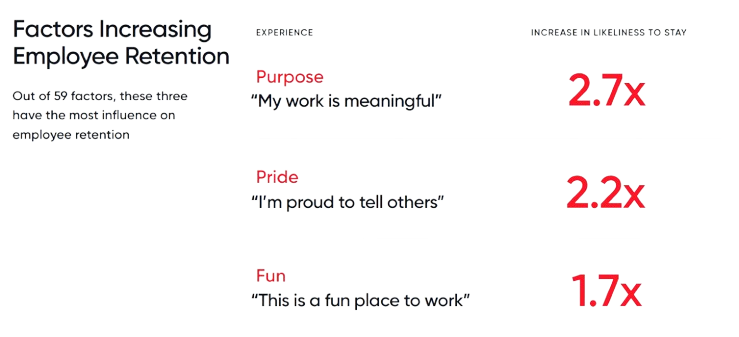
Public announcements of pullbacks in corporate sustainability, Diversity, Equity & Inclusion (DEI) initiatives and purpose-led commitments have prompted speculation about whether the era of purpose-driven business is over.
Has purpose lost its purpose?
At first glance, it’s easy to attribute this pushback to political populism, or a waning interest in purpose-driven business after reaching a peak.
But our experience across multiple sectors and speaking to many business leaders reveals a more nuanced story.
We have identified two key themes that help explain this change in approach towards organisational purpose:
- The success and more mainstream adoption of purpose has brought inevitable scrutiny
- ‘Purpose’ has been applied inconsistently and superficially by some organisations, sparking a wave of cynicism that previously did not exist
Although it may seem like businesses are watering down their focus on purpose, we are having conversations with businesses every day that suggest purpose is not disappearing. Instead, it is entering a more mature phase – one that demands deeper integration, greater accountability, and a clearer connection to value creation.
This is not the end of purpose. This is the start of a new phase.
Read on to explore the evolution of purpose and how to stay ahead as we enter this new era.
The roots of purpose
At Anthesis, we define purpose as a management approach for profitably solving the problems of people and the planet. It is the organisational “why” that informs strategy, decision-making and culture.
Purpose has been around for generations. The Cadbury family’s development of the Bournville village for the health and wellbeing of workers and Henry Ford’s efforts around worker welfare in the 1910s are two notable examples.
Supercharged by the likes of Paul Polman at Unilever and John Elkington’s Triple Bottom Line theory, purpose became known as a differentiator in the late 20th century: a way to engage employees, to build brand loyalty, and to create a meaningful impact in the world.
Purpose evolved into a mainstream business concept as companies began to recognise that a strong corporate purpose could attract talent, inspire innovation, and strengthen relationships with customers, suppliers and wider stakeholders.
Accompanying this wider adoption came mounting evidence to back a purpose-led approach. In research analysing 1.3 million employees, the Great Place to Work Institute found that of 59 factors, ‘purpose’ is the most influential in employee retention – increasing likelihood to stay by 2.7 times.

However, over recent months we have seen the emergence of a critical pushback – from both external observers and internal actors.
Enter the backlash
The backlash against purpose-led initiatives is sharpest around DEI and ESG (Environmental, Social & Governance).
In the US, major corporations including McDonald’s, Walmart, and Disney have downsized or eliminated DEI programmes in the last year.
In the UK, DEI budgets are being slashed and diversity-related roles quietly eliminated – including with regulators. Earlier this year saw the Bank of England scrap plans to introduce new diversity rules for financial institutions.
Sustainability is also under pressure on both sides of the Atlantic.
Our Cost of Silence report shows 79% of businesses are not communicating authentically on their environmental initiatives, either greenwashing or – more commonly – greenhushing.
Data from global advisory firm, Teneo, supports this phenomenon, reporting that last year less than half (49%) of S&P 500 companies issued press releases relating to their sustainability reports – down from 75% in 2021.
And this trend is not limited to communications.
Investor interest is cooling: only 48% of private investors considered ESG in 2024, down for the third year in a row, according to the Association of Investment Companies’ ESG Attitudes Tracker.
Prominent companies such as BP and HSBC have revised or delayed their climate targets, with some executives citing practicality and economic conditions as their rationale.
While many companies may rightly still consider themselves purpose-led without DEI and ESG, these initiatives are frequently the external manifestations of purpose itself.
Is purpose a victim of its own success?
Interestingly, this pushback can partially be explained by the success of purpose.
As purpose-driven principles have gained traction and become more visible, more companies have sought to align themselves with this way of differentiating their brand from competitors.
But some adopted lofty or ambiguous purpose statements without clear alignment to operations or performance – resulting in perceptions of inauthenticity and opportunism, rather than genuine commitment.
Primark’s 2018 Pride merchandise campaign, for example, faced criticism when it was revealed the products were manufactured in countries where LGBTQ+ rights are restricted and Pride itself is illegal.
This superficial or exaggerated application has contributed to a broader sense of cynicism around the idea of purpose.
This sentiment has been amplified by political and cultural divisions. Critics argue that the purpose agenda has overreached, with companies making outlandish or risky decisions to align with and leverage trending social movements that are in no way material to their business.
Even leading purpose organisations have felt the sting of this criticism. One of Unilever’s major investors publicly blamed the company’s “obsession” with purpose for its financial underperformance, fuelling the narrative that purpose distracts from core business priorities.
Is purpose a distraction?
But while a subset of companies are retreating from purpose initiatives, many others are doubling down. Behind the headlines, purpose is not vanishing but maturing – moving from aspiration to integration.
We are witnessing a transition. Companies that once used purpose as a slogan are now being called to embed it in strategy.
Superficial commitments are being replaced by a more deliberate and accountable approach. Tapestry – parent company of Coach, Kate Spade and Stuart Weitzman – offers a clear example. After criticism over gaps between its public DEI statements and internal practice, the company appointed its first Chief Inclusion and Social Impact Officer in 2022, elevating DEI from an HR initiative to a business-wide priority. Goals like pay equity, representation, and retention are now embedded in every function and tied to executive pay.
Purpose today demands more than storytelling. It requires action, measurement, and relevance. This is not about discarding purpose – this is a move from adolescent exuberance to adult responsibility.
Reframing the critique
The recent criticism is less a rejection of purpose itself and more about how it’s been applied. We are seeing a natural rebalancing.
- Purpose isn’t a panacea – It can’t single-handedly drive success. It cannot replace strong leadership, sound governance, or commercial acumen. At times, it’s been overused and/or shoe-horned belatedly into decisions.
- Decision-making complexity – Purpose can be difficult to apply for leaders trained to focus solely on financial metrics. Recognising this complexity is crucial – not as a reason to back away, but as a call to upskill and build new decision-making muscles.
- Higher expectations – Purpose-led organisations are held to a higher standard. Any misstep – real or perceived – invites accusations of hypocrisy, and the margin for error is seemingly slimmer when purpose is involved.
- Lack of focus – Some companies have tried to tackle too many societal issues simultaneously, diluting their impact. Purpose should guide focus on what’s truly material to the business and its stakeholders – not an open invitation to fix the world.
In the rush to embrace purpose and its principles many businesses have stumbled and learned valuable lessons along the way. In some cases, purpose has become a distraction, or even a barrier to progress. This often stems from leadership teams moving too quickly without equipping employees with the skills or support needed to operationalise purpose into their everyday role.
Purpose is now a business expectation
There is some evidence to suggest purpose has now evolved to become a baseline expectation.
According to the Enacting Purpose Initiative at Oxford Saïd Business School, board directors and investors now expect organisations to have a clearly defined corporate purpose that “drives not only its strategic investments and choices, but also its responsibilities to the societies from which they derive their licence to operate”.
Similarly, employees have come to expect purpose as an integral part of their work life. In our recent Leading Through Uncertainty research, we found that ‘having a purpose beyond simply maximising profit’ was the second most important trait employees looked for in leaders, after ‘clear communication’.
And the commercial results of purpose speak for themselves. A new report by CEO-led coalition Chief Executives of Corporate Purpose found that companies with a defined purpose deliver 58% higher revenue growth, and a 63% increase on returns on capital, compared to non-purpose-led peers.
Looking ahead: purpose 2.0
The most forward–looking companies are shifting from purpose as promise to purpose as practice, delivering it with consistency, authenticity, and measurable impact. This requires:
Relentlessly aligning purpose with performance
Success is all about sustainable performance – simultaneously delivering organisational performance and positive impact, not one at the expense of the other. Purpose-driven initiatives should contribute to commercial, operational or reputational uplift. And where there is no immediate commercial impact, think deeply and communicate clearly why this initiative will lead to a better-performing business in the long term.
Unilever actively track the performance of their Sustainable Living Brands – those taking action to support positive change for people and the planet and share progress openly. These brands have consistently outperformed the average growth rate of the company’s portfolio since the metrics were introduced in 2014.
Grounded in customer needs
Instead of working backwards from the societal challenges we face generally to find your purpose, start with your customers. What hopes, dreams and challenges do they have? What are the underlying societal issues causing these and how can you make a positive difference to these barriers?
Once you have identified these, re-evaluate how your organisation can change the wider system within its sphere of influence to address these challenges. Not only will this help your customers fulfil their needs, but it will also create opportunities for others to benefit from the system you have changed, and therefore ultimately create more impact for your business.
NatWest, at the forefront of purposeful financial services for a number of years, recently refreshed its purpose to be more directly linked to its role as a bank and the specific difference it can make to customers’ lives by helping them take action towards their goals, captured by “the bank that turns possibilities into progress”.
Moving from storytelling to storydoing
Actions speak louder than words. Companies which demonstrate purpose through innovation, transparency, and systemic advocacy build trust and impact more than any campaign.
Tony’s Chocolonely is known for powerful action towards 100% slave-free chocolate, with communication closely tied to stories that raise awareness of its purpose, including special edition packaging calling out competitors, petitions to the EU commission and interactive billboards. This storydoing has built the organisation an unrivalled reputation in the industry.
Use purpose with precision
Not every decision requires a purpose lens. But for core questions around growth, innovation and resilience, purpose can be a powerful filter. Which decisions, forums and processes will purpose make a material difference in, and which decisions should be left to other criteria? Be honest, upfront and confident about these, and facilitate training for colleagues to become confident on how to deploy purpose in these situations.
Johnson & Johnson’s Credo, originally written in 1943, challenges them to put the needs and well-being of the people they serve first, thinking about the doctors, nurses, hospitals and mothers who use their products. While the principles behind the Credo haven’t changed, the supporting guidance is updated periodically to reflect changing business context, societal expectations and use within the organisation. The most recent update crystalises the important strategic and day-to-day decisions that it should help shape.
Prepare for scrutiny
Purpose-led businesses must engage with critics, not ignore them. Invite in differences of opinion. Engage with the resistant forces to shape alternative (more robust) future plans, rather than shutting them out completely. Opposition can sharpen focus, improve design, and reveal blind spots. Embracing this friction is part of mature leadership.
Levi listened to critics of its DEI efforts, invited them to share their arguments and put these to shareholders – 99% of whom voted against the proposal to end DEI initiatives at its AGM earlier this year.
Purpose: a more intentional chapter
The backlash against purpose is not a sign of its demise, but evidence of its maturity. Where once purpose was an emerging differentiator, it is now part of the mainstream – and even a baseline expectation. It now comes under more scrutiny and greater pressure to deliver.
Purpose can survive – and flourish – in this new era when businesses apply purpose with precision, accountability, and strategic clarity. The performative era is over – what comes next is more rigorous, intentional, and impactful.
Share this article
Anthesis partners with ambitious organisations to define and embed purpose and create the change needed to unlock true sustainable performance. We bring together a unique set of capabilities including business strategy, transformation, innovation and education to equip businesses and leaders with the tools they need to navigate today’s business landscape.



